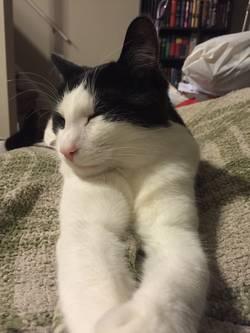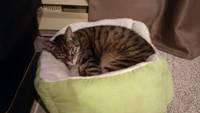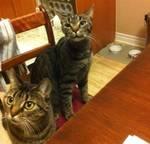
Indoor cats may not share the same risks as outdoor cats. While they might not require the same types of vaccines and frequency of deworming as outdoor cats, it is still very important to regularly take your indoor cat to your veterinarian. Annual check-ups are important even if your cat does not need vaccines. Here are some reasons why your indoor cat should see your veterinarian regularly:
- Cats are very good at hiding problems. Cats are both a predator and prey species in the wild. This means that cats, in order to survive, have learned to hide illness and injury very well. Veterinarians are trained to look for these subtle signs. By taking your cat regularly to the vet, any problems or illnesses can be addressed earlier and your cat can live a longer, healthier and more comfortable life.
- Dental disease is very common but hard to see. By the age of three, almost 80% of cats have some form of dental disease. Dental issues can cause severe pain; this may not be noticed until the disease has progressed very far. Cats will often still eat, even hard kibbles, in the face of severe dental pain. Addressing dental disease early can help prevent this pain and may allow your cat to keep its teeth as opposed to facing extractions in more severe dental disease. Regular visits with your veterinarian can allow him or her to make recommendations to help prevent dental disease and to address dental disease early when it happens in order to save your cat’s teeth.
- Obesity can significantly shorten your cat’s lifespan. Obesity is also very common, affecting over 60% of cats. Indoor cats especially are often affected. Obesity can lead to issues such as diabetes, arthritis, constipation, urinary tract infections, skin and mobility issues. Recent studies have shown that obesity can remove up to two years off your pet’s life! Sometimes it is difficult for people to evaluate whether or not their cat is overweight. Regular visits to your veterinarian means your vet can recommend proper diets and exercise programs to ensure your cat is at a healthy weight. It is also important to address weight loss through your veterinarian because if a cat loses weight too quickly, the result can be liver disease.
- Vaccines are still important. Even though your cat may not go outdoors, it is not uncommon to have other animals come into your house. Bats often fly into homes and they are one of the top Rabies carriers in Ontario. Keeping your cat up to date on vaccines gives you piece of mind that your cat and family are safe should this ever happen. Also, there is always the risk that your indoor cat may get outside and be exposed to other cats or wild animals.
- Indoor cats can still get worms. A recent study has shown that up to 50% of all cats have intestinal worm infestations that did not show up on fecal analysis. So even though your cat does not go outside, sometimes bugs and small mammals can get inside and expose your cat to intestinal worms. If you have other pets that do spend time outside (e.g. dogs), they can also act as carriers. If you live with children, elderly or other immune compromised people, it is important that even your indoor cat be dewormed regularly to prevent transmission of worms to people.
- Senior cats age quickly. Senior cats can become quite ill very quickly if problems are not caught early. Many senior cats also have arthritis, which can be extremely painful, but they can hide it very well. We recommend senior cats be seen twice annually. As stated earlier, the sooner we address problems, the longer, healthier and more comfortable life your cat will be able to live. If you have any questions about your indoor cat give our team at Mitchell Veterinary Services a call.
If you have any questions about your indoor cat give our team at Mitchell Veterinary Services a call.


